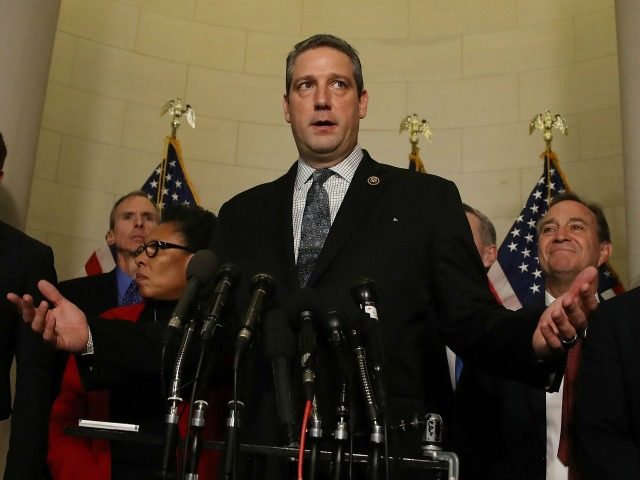Sixty-three House Democrats voted for rebel Rep. Timothy Ryan of Ohio, not enough for him to replace California’s Nancy Pelosi as Minority Leader.
“It is what it is,” Ryan told reporters in the Capitol complex. House Democrats had gathered to debate Pelosi’s future after they failed to reclaim control of the chamber for the fourth election cycle in a row. Pelosi received 134 votes.
Ryan said he ran against Pelosi, the first female House Speaker and the daughter and sister of mayors of Baltimore, because there is a disconnect between the House Democrats and the American voters, both on policy and generation-wise.
“As Democrats, we have to talk about economics, the issues that unite us,” he said. “If we are going to win as Democrats, we need an economic message that resonates in every corner of this country and come out of this leadership election united as Democrats.”
The Ohio Democrat said he would let others speculate why one-third of the caucus supports his challenge.
Going into the next session of Congress, the Republicans hold 240 seats, the Democrats 194, with one seat to be decided in a run off. Of the 23 most contested seats in 2016, Republicans won 15.
Pelosi put on a brave face when she addressed reporters 30 minutes after Ryan walked away from the microphones.
The California Democrat said she was “exhilarated” adding, “I have a spring in my step.”
One of the most compelling arguments made by Ryan’s supporters, especially Rep. Stephen Lynch of Massachusetts, was that there was no way Pelosi would lead the party back into the majority.
Pelosi took that issue straight on: “We know how to win elections. We’ve done it in the past and we are going to do it again.”
Lynch told reporters that Pelosi is going to have to figure what to do in the future because what she has done in the past is not working.
“The Democratic Party, in many areas of the Midwest–our brand is toxic right now,” Lynch said. “It is very, very tough for a Democrat to get elected in some of those districts, because of our message and because of our approach out there.”
Republicans had cleaned the clocks of the Democrats in 2016 and in the previous cycles in the Midwest, he said. “That’s our natural base, those are manufacturing workers, those are workers that should be supporting us. But, it was Donald Trump, who said: ‘I want to protect you from illegal labor coming in and undermining the wage, I’m going to protect you from these trade agreements that are shipping your jobs overseas’–that was our message.”
Ohio’s Rep. Marcia C. Kaptur said in the end Pelosi prevailed because of her unparalleled ability to raise cash for House and the personal relationships she has built over the years–always treating her members with respect even when they disagreed with her.
Kaptur said she signed a letter of support with other Democratic congresswomen and she voted for Pelosi, although Ryan was from her state and she agreed with his critiques of how the House Democrats abandoned working class and rural voters in favor of parts of the country, where the economy is better.
“First of all, our national party has to change,” she said. “We have to recruit more aggressively in the part of the country that I represent and fund those candidate.”
The Ohio congresswoman said despite the seriousness of the challenge by Ryan, her follow Ohioan handled himself very well and committed himself to working with Pelosi and her leadership team.
Ryan also exposed House Democrats from more prosperous parts of the country to what his own Youngstown and other rust belt cities have experienced, she said.
“He was speaking from a part of the country that most of these members couldn’t imagine,” she said. “They really haven’t walked the walk.”
The vote by the secret ballot vote by the House Democrats was in intramural contest to determine their caucus’ nominee of Speaker of the House in January. Incoming Democratic congressman, not yet sworn in voted, while outgoing congressmen did not. A case in point was Rep. Tammy Duckworth (D.-Ill.), winner of a Senate seat Nov. 8, who was scoping out the Senate side of the Capitol with her staff as her colleagues decided whether or not to renominate Pelosi.
Another Ryan supporter, California Rep. James M. Costa, said in January when the whole House votes for speaker, there will be another opportunity for disenchanted House Democrats to register their knocks against their leader.
Costa said there will not be 63 votes against Pelosi, because the roll call for speaker is a public event.
“Those who are frustrated and discontent on Jan. 3 or Jan. 4, whenever, I am sure there will be 10 or 20,” he said.
Costa said he did not know if he would be one of the 10-to-20 himself.
In the 2011 election for speaker, Costa voted for Rep. Dennis A. Cardoza (D.-Calif.) and Cardoza voted for Costa and another 11 House Democrats voted for Rep. Heath Shuler (D.-N.C.) instead of Pelosi with five other votes for other House Democrats.

COMMENTS
Please let us know if you're having issues with commenting.